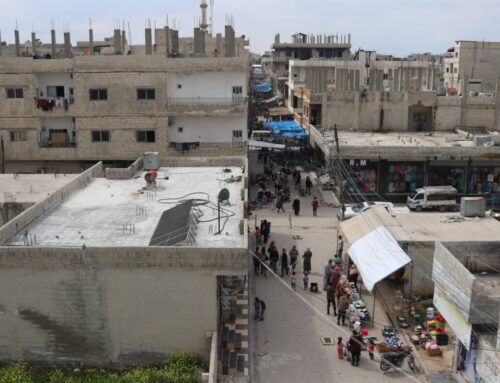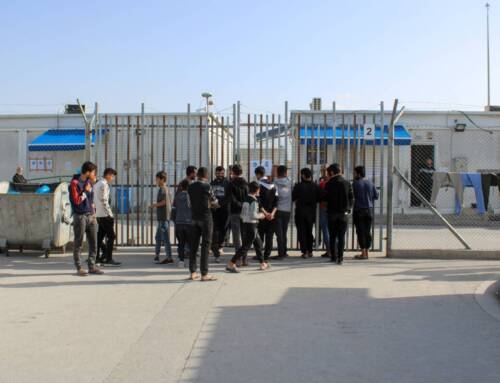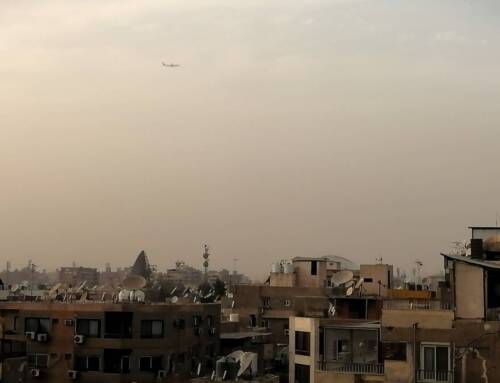From Syria to Ukraine, Russian destruction follows Syrians in exile
In the third week of Russia’s attack on Ukraine, more than 2.8 million people have now fled the country. Syrians are among those fleeing, reliving earlier experiences of displacement.
16 March 2022
PARIS — Following a “sleepless” three-day journey, Roj Mousa reached the German capital of Berlin late last month after fleeing the Russian bombardment of the Ukrainian capital Kyiv. The experience brought back memories of the first time he was displaced, from Aleppo city’s Sheikh Maqsoud district to Afrin, in its northern countryside.
On the second day of Russia’s attack on Ukraine, which began on February 24, the 23-year-old Syrian Kurd decided to leave the country. He headed west to the city of Lviv on the border with Poland, a trip that “took 16 hours and cost $1,000, for a distance that could be traveled in five hours for just $30 before the war,” he told Syria Direct.
The road from Kyiv was terrifying, as Russian bombardment struck targets in the capital and its surroundings. But from Lviv to the Medyka Polish border crossing, the road was “painful–physically and psychologically,” said Mousa. “I crossed half the distance between Lviv and the Polish crossing, around 30 kilometers, on foot,” he added, same as the “women, children and old men, Ukrainians and other nationalities.”
Mousa made it to Berlin on February 28, but has yet to apply for asylum there, as he is waiting “until some laws become clear, so my situation can be taken into account,” he said.
Since Russia’s attack began, Ukraine has seen a mass exodus of people fleeing to other European countries. As of March 13, more than 2.8 million people have fled, according to the United Nations, with more than 1.7 million people crossing into Poland alone through the Dorohusk, Hrebenne and Medyka crossings. Among them are Syrians, some of whom are reliving earlier experiences of displacement in both Syria and Ukraine, as well as personal losses due to Russian bombings.
Lost stability
Mousa arrived in Ukraine in April 2021, coming from Iraqi Kurdistan on an annual residence permit. Once there, he started to learn Ukrainian to prepare for “completing my studies, which I was deprived of in Syria,” he said, adding that he hoped for the stability he was denied several times in his homeland.
On March 29, 2013, Mousa fled with his family from their native Sheikh Maqsoud to Afrin city in the northern Aleppo countryside after Jabhat al-Nusra stormed the district. In March 2018, after Turkey and Ankara-aligned opposition factions launched Operation Olive Branch against the Kurdish People’s Protection Units (YPG) in Afrin, Mousa’s family fled again. They fled to the Afrin countryside, then made their way to Autonomous Administration (AANES) areas east of the Euphrates in northeastern Syria. Mousa ultimately left for Iraqi Kurdistan, and finally made his way to Kyiv.
Before coming to Ukraine, Mousa expected the country would experience war, but “in eastern or southeastern Ukraine,” he said. “I didn’t think it was likely for bombing to reach the capital.” But it did. And “the airstrikes and artillery shelling, and then the crowding at border crossings–it brought me back to all the details of what we experienced in Syria.”
Muhammad al-Rashidat, 32, reached Austria in early March with his wife and two children after what he described as an “arduous asylum journey” out of Ukraine.
Before Russia attacked, al-Rashidat, who is originally from Syria’s southern Daraa province, had been living in the central Ukrainian city of Dnipro. After it came under Russian bombardment, he fled Ukraine after 14 years of living there.
For him, like Mousa, leaving Ukraine was a repeated experience of displacement. In 2014, he fled the eastern Ukrainian city of Luhansk for Dnipro after war broke out between Russian-backed separatists and the Ukrainian military in Donbas.
Abdulrahman al-Shami, 40, also fled Donbas in 2014. With border areas with Russia unsafe, he decided to go to Lviv, western Ukraine, as far away as he could get.
Realizing “Russia would not be content with the Donbas region, I decided to move as far away from the Russians as possible,” said al-Shami. Originally from Damascus, he came to Ukraine in mid-2011.
In Lviv, al-Shami has not been physically impacted by the latest Russian attack on Ukraine, but he has been an eyewitness to one of the country’s biggest humanitarian crises. The city, near the Polish border, “receives thousands of people fleeing bombardment every day,” he told Syria Direct.
“Lviv has changed, and become crowded with refugees. People here are shocked,” said al-Shami. “Ukrainians have not absorbed the shock, they think the war with the Russians will be short,” said al-Shami. “But from my perspective, and through our experiences in Syria, the Russians can’t be trusted and the days to come may bring worse.”
‘Putin is following us’
Haitham Haj Muhammad, 51, left Syria for Ukraine in 2010, before the Syrian revolution broke out in 2011 and before Russia intervened militarily in support of the Assad regime in September 2015. But while he was physically safe from Russian warplanes, his family was not. Haj Muhammad said he lost “the closest people to me” in Russian bombardment of his home village of Kansafra, in the Jabal a-Zawiya area of the southern Idlib countryside.
In early March, Haj Muhammad and his family fled Russian bombing in Kyiv. The same month five years earlier, in 2017, “a Russian missile targeted my sister’s two-story house, killing her, her four children, and her daughter-in-law,” he told Syria Direct.
Russian bombing “destroyed our village,” Haj Muhammad said. “Our house is on the ground, our whole neighborhood is on the ground–all from the Russians.”
Syrians’ experiences of Russian bombings prompted Haj Muhammad to leave Kyiv early, accompanied by his wife and sons, especially as “the sound of explosions was close to my house, and armored vehicles were in the streets.” After “an arduous journey, and waiting at the border crossing for more than 14 hours,” he and his family made their way to Sweden, where his brothers and sisters live, and started the asylum process.
“Praise God, we have reached safety,” said Haj Muhammad.
But not everyone is leaving. Fadi Omar, 34, is still in Kyiv, where “the raids are continuing, and there is war in the streets.” Omar is originally from the East Ghouta suburbs of Damascus, but came to Ukraine in 2012 and obtained permanent residency. He is still in the embattled capital city, he says, because “I have no options, and I can’t go back to Syria because I am wanted by the regime.”
While Arab and international media has reported discrimination against Arab refugees at the Polish border, the Syrians who crossed the border in recent weeks who spoke to Syria Direct said they did not experience it.“Setting aside a line for Ukrainians and another for foreigners was to facilitate the entry process, not out of discrimination,” in Mousa’s perspective. That does not mean “there are no mistakes by the border guards,” he added.
And not everyone who wants to leave Ukraine is able to. Ali Amer (a pseudonym), originally from Syria’s eastern Deir e-Zor province, cannot leave the country “because I have Ukrainian citizenship, and after emergency law was imposed, Ukrainian males aged 18-60 are prohibited from leaving,” he said.
“Whether Syrian or Ukrainian, Putin is following us,” said Amer, who has lived in the city of Odessa since 2010. “The Ukrainian citizenship that Syrians living in Ukraine hoped for has become a curse on me, preventing me from leaving the country.”
The fate he faces today, “from displacement, lack of services, a siege by Russian forces and the dismemberment of cities, my people lived it in Deir e-Zor,” he said.
Repercussions of the war
When the Russian attack on Ukraine began, Syrians reacted to the event as though it was inside their country, given that Russia is a key party to the war in Syria and that its strikes in Ukraine returned “the Syrian tragedy to the forefront,” said al-Shami. “The fingerprints of Russia’s criminality in Ukraine are identical to what happened in Syria.”
The first impacts of the war for Syrians affected the dozens of residents in Ukraine, most of whom arrived there before the Syrian revolution began to complete their university studies, as Ukraine is a destination for Arab students.
But the Russian-Ukrainian war has also divided Syrians at home and abroad into two groups. Opponents of the Syrian regime oppose the Russian attack, while those loyal to it have lined up on the side of Russia, at least according to Syrian state media.

In Hasakah city, demonstrators raise Syrian and Russian flags in support of the Russian war against Ukraine, 10/3/2022 (SANA)
On March 11, Russian President Vladimir Putin allowed the Russian Defense Ministry to transfer fighters from the Middle East to participate in the war against Ukraine. The same day, pro-regime Facebook pages posted a mechanism for Syrians to volunteer alongside Russian forces, saying it was being done in coordination with the Syrian Defense Ministry’s recruitment division.
In this context, Russian researcher Kirill Semenov, an independent analyst and expert at the Moscow-based Russian International Affairs Council (RIAC), considers the participation of Syrian fighters alongside Russia unlikely because of several obstacles, including “the language problem, and integration into battle formations.”
“Some Syrians may arrive in Russia, but their work would be in the context of public relations, no more,” Semenov said.
On the military front, Semenov expects “a decrease in the activity of Russia and Assad in Syria, because carrying out military operations in Syria, at a time when Europe is seeing a significant escalation, is a big risk.” Also, “Russia is interested in maintaining good relations with Turkey,” he said.
Aron Lund, a researcher at the Swedish Defense Research Agency (FOI), said although “America and Russia are trying to separate their disagreements and deal with Syria as a separate issue,” that does not mean that the Russia file is not impacted by the Ukrainian one.
Lund warned that the Russian-Ukrainian war will affect Syria’s humanitarian situation. “We are going to engage in tense negotiations in the Security Council this summer on cross-border humanitarian access,” he said, and while “these negotiations are not linked to Ukraine, the crisis in relations could lead Russia to use its veto against the continued arrival of aid.”
Syria and its neighbors, including Turkey and Lebanon, also rely heavily on “importing wheat from the Black Sea region, from Russia, Ukraine, Romania and other countries,” Lund said. For that reason, “the war may disrupt wheat shipments from the region, and consequently affect their arrival to these countries, and be reflected in their prices,” amid “extremely serious humanitarian conditions in Syria.”
From Lviv, al-Shami views the repercussions of the Russian-Ukrainian war from another perspective. “Russian war crimes in the heart of Europe will mobilize the international community against Russia in Ukraine and Syria,” he predicted. “There is a link between the Syrian and Ukrainian path, in one form or another.”
“There is nothing worse than leaving your home and everything in it and setting out into the unknown,” said Mousa, now displaced once more, nine years after the first time he fled his home in Syria.
This report was originally published in Arabic and translated into English by Mateo Nelson.







